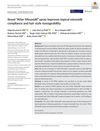 1 citations,
April 2022 in “International Journal of Women's Dermatology”
1 citations,
April 2022 in “International Journal of Women's Dermatology” Classifying curl patterns might help doctors assess and treat hair loss better.
 1 citations,
December 2021 in “JAAD case reports”
1 citations,
December 2021 in “JAAD case reports” A woman with severe hair loss saw significant hair regrowth after adding platelet-rich plasma injections to her treatment with tofacitinib.
 1 citations,
June 2021 in “Journal of Cosmetic Dermatology”
1 citations,
June 2021 in “Journal of Cosmetic Dermatology” Enzyme booster SULT1A1 greatly enhances hair regrowth with minoxidil.
 1 citations,
October 2020 in “Journal of Investigative Dermatology Symposium Proceedings”
1 citations,
October 2020 in “Journal of Investigative Dermatology Symposium Proceedings” The summit concluded that new treatments like Jak inhibitors show promise for Alopecia Areata and personalized approaches are needed.
 1 citations,
August 2020 in “Journal of The American Academy of Dermatology”
1 citations,
August 2020 in “Journal of The American Academy of Dermatology” The authors agree that standardizing how PRP methods are reported could help compare results, but note that the link between PRP's contents and hair growth is unclear, and recommend avoiding split-scalp designs in future trials.
 1 citations,
August 2020 in “Journal of Cosmetic Dermatology”
1 citations,
August 2020 in “Journal of Cosmetic Dermatology” The "After Minoxidil" spray makes hair easier to style, less greasy, and encourages people to keep using the treatment.
 1 citations,
November 2017 in “Journal of Investigative Dermatology”
1 citations,
November 2017 in “Journal of Investigative Dermatology” Platelet-rich plasma and microneedling could potentially help hair regrowth in alopecia areata patients, but more research is needed.
1 citations,
July 2016 in “PubMed” Once-daily 5% minoxidil foam and twice-daily 2% minoxidil solution are similarly effective and safe for female pattern hair loss.
 1 citations,
April 2010 in “Expert Review of Dermatology”
1 citations,
April 2010 in “Expert Review of Dermatology” The document concludes that early diagnosis and treatment are crucial for managing rare hair loss disorders and that more research is needed to improve treatment strategies.
1 citations,
September 2007 in “Hair transplant forum international” Comparing hair restoration techniques is hard due to many variables and inconsistencies.
1 citations,
May 2006 in “Hair transplant forum international” Well-designed clinical trials are needed to improve hair restoration methods.
 November 2024 in “JAMA Dermatology”
November 2024 in “JAMA Dermatology” Low-dose oral minoxidil may help with hair loss, but more research is needed.
 November 2024 in “International Journal of Dermatology”
November 2024 in “International Journal of Dermatology” Chemical treatments and tight hairstyles may lead to earlier hair loss.
November 2024 in “Dermatology Online Journal” Light-based therapies show promise as safe treatments for hair loss.
 October 2024 in “JAAD Case Reports”
October 2024 in “JAAD Case Reports” Dutasteride mesotherapy showed mixed results and is not recommended as a primary treatment for hair loss.
 September 2024 in “Archives of Dermatological Research”
September 2024 in “Archives of Dermatological Research” Both treatment combinations improved hair growth similarly and were safe.
 September 2024 in “Journal of the American Academy of Dermatology”
September 2024 in “Journal of the American Academy of Dermatology” Dermatologists can detect smaller hair density changes than previously thought.
 August 2024 in “Archives of Dermatological Research”
August 2024 in “Archives of Dermatological Research” Low-dose oral minoxidil is effective and safe for treating androgenetic alopecia.
 July 2024 in “The journal of investigative dermatology/Journal of investigative dermatology”
July 2024 in “The journal of investigative dermatology/Journal of investigative dermatology” Using both topical and oral minoxidil does not reduce hair shedding.
 July 2024 in “JAAD Case Reports”
July 2024 in “JAAD Case Reports” Corticosteroid injections for hair loss may cause eye problems, so caution is needed.
 May 2024 in “International Journal of Dermatology”
May 2024 in “International Journal of Dermatology” More research is needed to understand if GLP-1 agonists affect hair health.

Genetic testing can help diagnose skin conditions but needs more research for full effectiveness.
 April 2024 in “International Journal of Dermatology”
April 2024 in “International Journal of Dermatology” Oral minoxidil may worsen hangover symptoms when combined with alcohol.
April 2024 in “Journal of the American Academy of Dermatology”  March 2024 in “JAAD International”
March 2024 in “JAAD International” Using both topical and oral minoxidil doesn't significantly reduce temporary hair shedding.
March 2024 in “Journal of the American Academy of Dermatology” 
The document concludes that more standardized research is needed to understand exosome therapy's safety and effectiveness for hair loss treatment.
 January 2024 in “Journal of the American Academy of Dermatology”
January 2024 in “Journal of the American Academy of Dermatology” The document concludes that more research is needed to confirm if COVID-19 vaccines cause a type of hair loss called alopecia areata.
 November 2023 in “European medical journal. Dermatology”
November 2023 in “European medical journal. Dermatology” PRP can reduce pain and improve function, but more standardized research is needed.

Baricitinib therapy helped many patients with severe alopecia regrow hair after 52 weeks.
























